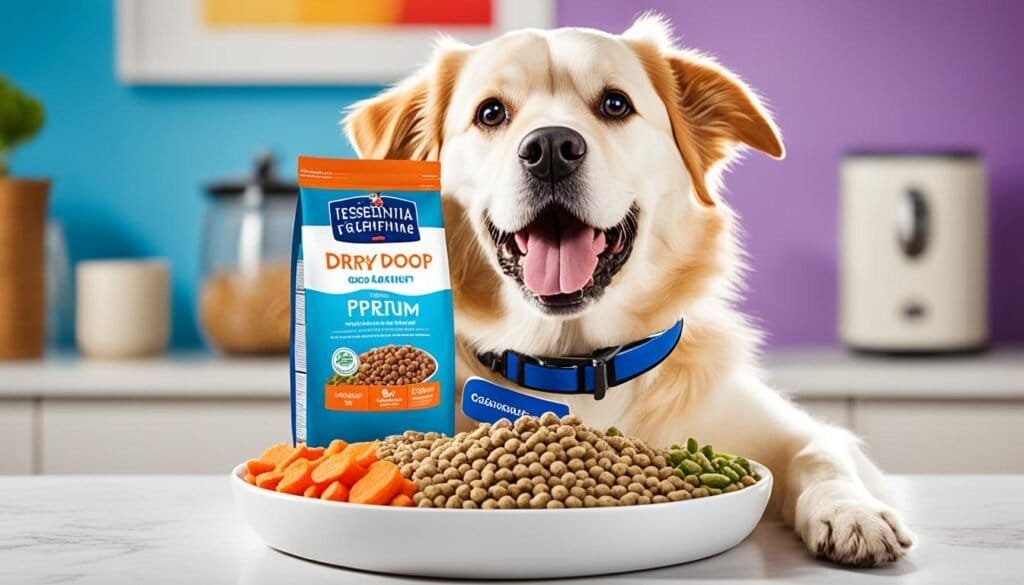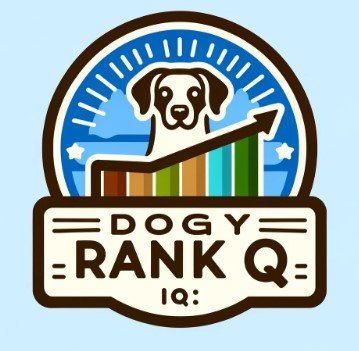Did you know that a staggering 80% of veterinarians recommend a specific dog food brand to their clients? When it comes to your canine companion’s nutrition, the choices you make can have a profound impact on their overall health and well-being. As a pet owner, navigating the vast world of dog food can be overwhelming, but with the guidance of veterinary experts, you can ensure your furry friend thrives on a diet tailored to their unique needs.
When choosing between wet and dry dog food, both can be good nutritional choices for your dog, but each comes with pros and cons. The best dry dog food is convenient, cost-effective, and can even benefit oral health, but wet food provides significantly more moisture. The quality of your dog’s kibble is primarily determined by palatability, a complete and balanced recipe, affordability, and whether the food meets your veterinarian’s approval based on your dog’s nutritional needs. Veterinarians recommend looking for a dog food with an AAFCO nutritional adequacy statement, as this ensures the food contains all the necessary nutrients. They also advise choosing a recipe created with the guidance of a board-certified veterinary nutritionist, as this is more likely to provide the appropriate nutrients for your dog’s age and breed size.
Key Takeaways
- Veterinarians recommend looking for dog food with an AAFCO nutritional adequacy statement.
- Choosing a recipe created with the guidance of a board-certified veterinary nutritionist ensures appropriate nutrients for your dog’s age and breed size.
- The quality of your dog’s kibble is determined by palatability, a complete and balanced recipe, affordability, and veterinarian approval.
- Both wet and dry dog food can be good nutritional choices, with each offering unique benefits.
- Consulting your veterinarian is crucial for understanding your dog’s specific dietary needs and any restrictions or sensitivities.
Understanding Your Dog’s Nutritional Needs
To ensure your dog gets the essential dog nutrition and canine dietary requirements they need, it’s crucial to purchase the appropriate veterinary-approved dog food for their life stage and breed size. Dog foods are typically categorized into three stages: growth, all life stages, and adult maintenance.
Importance of Consulting Your Veterinarian
Consulting your veterinarian is vital, as they can provide guidance on your dog’s specific dietary needs and any restrictions or sensitivities they may have. By working closely with your vet, you can develop an understanding of your pet’s unique dog nutrition requirements and ensure they receive the optimal diet for their health and well-being.
Nutritional Requirements Based on Breed, Size, and Age
Nutritional requirements can vary significantly based on a dog’s breed, size, and age, so it’s essential to choose a dog breed-specific food that is tailored to your pet’s individual needs. Puppies, adults, and senior dogs all have different dietary requirements, and certain breeds may also have specialized nutritional needs based on their genetic adaptations and metabolic profiles.
Identifying High-Quality Dog Food

When selecting a nutritious dog food, it’s essential to look for products that carry the AAFCO (Association of American Feed Control Officials) nutritional adequacy statement. This seal of approval ensures the food contains a complete and balanced blend of essential nutrients your dog needs to thrive. Additionally, the quality of the protein sources in the premium dog food brands you choose plays a crucial role in your dog’s overall health and well-being.
Checking for AAFCO Nutritional Adequacy Statement
The AAFCO nutritional adequacy statement on a dog food label indicates that the product has been formulated to meet the essential nutrient requirements for your pet’s life stage, whether that’s growth, maintenance, or all life stages. This assurance from a trusted industry authority helps you feel confident that you’re providing your furry friend with a healthy dog diet tailored to their specific needs.
Importance of Animal Protein Sources
When evaluating the ingredient list, prioritize animal-based protein sources such as chicken, beef, or lamb. These high-quality proteins are more easily digested and provide your dog with a complete amino acid profile, supporting their muscle development, immune function, and overall health. Avoid dog foods that rely heavily on plant-based proteins or by-products, as these may not be as biologically available or beneficial for your canine companion.
Assessing Carbohydrate and Fiber Sources
In addition to high-quality proteins, look for holistic pet food options that incorporate wholesome carbohydrate and fiber sources. Complex carbohydrates, such as those found in brown rice or oats, provide sustained energy, while dietary fiber promotes healthy digestion. Steer clear of grain-free dog food options unless your veterinarian specifically recommends them, as they may not be necessary for all dogs and can potentially lack important nutrients.
Top Veterinarian-Recommended Dry Dog Food Brands

When it comes to choosing the best dry dog food, veterinarians recommend several top brands that consistently meet or exceed the AAFCO nutritional recommendations. These dry dog food formulas are developed with the oversight of board-certified veterinary nutritionists, ensuring they provide your furry friend with a complete and balanced diet tailored to their specific needs.
Royal Canin: Tailored Solutions for Different Breeds and Life Stages
Royal Canin is a trusted veterinary-approved dog food brand known for its peer-reviewed research and well-regarded reputation. The company offers a wide range of veterinary-approved dog food solutions, each designed to cater to the unique needs of different dog breeds and life stages. Whether your pup is a small-breed puppy or a large-breed adult, Royal Canin has a premium dog food brand formulated to meet their specific nutritional requirements.
Hill’s Science Diet: Scientifically Formulated Recipes
Hill’s Science Diet is another highly recommended veterinary-approved dog food brand, renowned for its scientifically formulated recipes. These recipes are developed with input from veterinary professionals and are designed to provide your dog with a complete and balanced diet to support their overall health and wellness.
Purina Pro Plan: Nutrient-Dense Options for Various Needs
Purina Pro Plan is a premium dog food brand that offers a wide range of nutrient-dense dry dog food options to cater to various needs. From weight management to breed-specific formulas, Purina Pro Plan provides dog owners with high-quality, veterinary-approved dog food choices that can meet the unique dietary requirements of their furry companions.
Best Dog Food Choices Recommended by Veterinarians
Veterinarians recommend specific dog food formulas for different life stages to ensure your pet receives optimal nutrition. Whether you have a growing puppy, a vibrant adult dog, or a senior canine, selecting the right veterinary-approved dog food can make a significant difference in their overall health and well-being.
Puppy Formula: Providing Optimal Nutrition for Growth and Development
Puppies have unique nutritional requirements to support their rapid growth and development. Veterinarians often recommend puppy formulas that are designed to provide the necessary calories, high-quality proteins, and essential vitamins and minerals to fuel your young pup’s journey. Look for puppy foods that meet the AAFCO standards and are formulated with the guidance of board-certified veterinary nutritionists to ensure your furry friend receives a healthy dog diet tailored to their specific needs.
Adult Dog Food: Maintaining Health and Vitality
As your dog transitions into adulthood, their nutritional needs shift to maintaining optimal health and vitality. Veterinarians suggest adult dog food formulas that provide a balanced blend of nutrients to support your canine companion’s energy levels, immune function, and overall well-being. These recipes are often tailored to dog breed-specific food requirements, ensuring your adult dog receives the precise nourishment they need.
Senior Dog Food: Supporting Aging Pets with Special Dietary Requirements
As our canine companions enter their golden years, their nutritional needs may change to address the unique challenges of aging. Veterinarians often recommend senior dog food formulas that are designed to support joint health, maintain muscle mass, and provide the appropriate calorie and nutrient levels for older dogs. These specialized diets can help your senior pup thrive and enjoy their twilight years with vitality and comfort.
Wet vs. Dry Dog Food: Pros and Cons
When it comes to providing your canine companion with the best dog nutrition and a healthy dog diet, both wet and dry dog food can be excellent choices. However, each type of dog food comes with its own unique advantages and disadvantages that are worth considering.
Convenience and Cost-Effectiveness of Dry Food
Dry dog food is generally more convenient and cost-effective for pet owners. The kibble format is easy to store, measure, and feed, and many dry dog food brands are relatively affordable, making them a practical long-term solution. Additionally, the crunchy texture of dry food can help maintain your dog’s dental health by reducing plaque and tartar buildup.
Hydration and Palatability Benefits of Wet Food
On the other hand, wet dog food provides significantly more moisture than its dry counterpart, which can be beneficial for dogs that struggle to stay adequately hydrated. The increased moisture content can also make wet food more palatable and appealing to finicky eaters. Veterinarians often recommend a combination of wet and dry food to ensure your dog receives the benefits of both.
Ultimately, the best approach is to consult your veterinarian, who can provide guidance on the most suitable dog nutrition and healthy dog diet based on your pet’s individual needs, preferences, and health status.
Transitioning to a New Dog Food
When transitioning your dog to a new dog nutrition or healthy dog diet, it’s crucial to do so gradually to avoid digestive upset. Starting a new food too quickly can lead to gastrointestinal issues like diarrhea or vomiting, so a slow and steady approach is recommended.
Gradual Introduction to Avoid Digestive Upset
Begin by mixing a small amount of the new food with your dog’s current food, and gradually increase the ratio of new to old over the course of 7-10 days. This gradual transition allows your dog’s digestive system to adjust to the new formula, minimizing the risk of an upset stomach.
Monitoring Your Dog’s Response and Adjusting as Needed
As you transition your dog to the new food, closely monitor their response, such as stool quality and energy levels. If you notice any signs of digestive distress, you may need to slow down the transition or consult your veterinarian. It’s important to make adjustments as needed to ensure your dog’s comfort and well-being during this process.
Consulting your veterinarian is also recommended if you have any concerns about your dog’s transition to a new dog diet. They can provide guidance based on your pet’s individual needs and help ensure a smooth and successful change in food.
Conclusion
Choosing the right dog food is essential for your pet’s overall health and well-being. By consulting with your veterinarian, understanding your dog’s specific nutritional needs, and selecting high-quality, veterinarian-approved dog food brands, you can ensure your furry friend receives a balanced, nutritious diet that supports their growth, development, and longevity. Remember to transition to new dog foods gradually and monitor your dog’s response to ensure they thrive on their new diet.
The Association of American Feed Control Officials (AAFCO) plays a crucial role in establishing nutritional standards in the pet food industry, ensuring that pet foods are labeled as ‘complete and balanced’ based on current scientific research. Additionally, the World Small Animal Veterinary Association (WSAVA) provides valuable recommendations for obtaining specific information from pet food manufacturers to ensure quality. By staying informed and making informed decisions, you can provide your dog with the best possible dog nutrition and support their overall well-being.
Remember, there is no one-size-fits-all approach when it comes to dog food. Your veterinarian can help you identify the dog food that best meets your pet’s unique canine dietary requirements, whether it’s a premium dog food brand, a holistic pet food option, or a grain-free dog food. By working closely with your veterinarian and paying attention to your dog’s individual needs, you can ensure they receive the healthy dog diet they deserve.
FAQ
What are the pros and cons of wet and dry dog food?
Both wet and dry dog food can be good nutritional choices, but each has its own advantages. Dry dog food is generally more convenient and cost-effective, while wet food provides more moisture and can be more palatable for some dogs. Veterinarians often recommend a combination of wet and dry food to ensure your dog gets the benefits of both.
What should I look for when choosing high-quality dog food?
When evaluating dog food options, it’s important to look for a product that is labeled with an AAFCO nutritional adequacy statement, as this indicates the food contains all the necessary nutrients for your dog’s life stage. The quality of the protein sources is also crucial, as animal-based proteins are more easily digestible and provide a complete amino acid profile. Additionally, the carbohydrate and fiber sources in the dog food should be high-quality and provide essential nutrients and energy for your pet.
What are the top veterinarian-recommended dry dog food brands?
Veterinarians recommend several top dry dog food brands that meet or exceed the AAFCO nutritional recommendations and are formulated with the oversight of board-certified veterinary nutritionists. These include Royal Canin, Hill’s Science Diet, and Purina Pro Plan.
How do I choose the right dog food for my pet’s life stage?
Veterinarians recommend specific dog food formulas for different life stages to ensure your pet receives optimal nutrition. Puppy formulas are designed to provide the necessary calories, proteins, and nutrients to fuel growth and development, while adult dog foods help maintain health and vitality. As dogs age, senior-specific formulas may be recommended to support their special dietary requirements, such as reduced calorie needs or increased joint support.
How do I transition my dog to a new food?
When transitioning your dog to a new food, it’s important to do so gradually to avoid digestive upset. Start by mixing a small amount of the new food with your dog’s current food, and slowly increase the ratio of new to old over the course of 7-10 days. Monitor your dog’s response, such as stool quality and energy levels, and make adjustments as needed. Consult your veterinarian if you have any concerns about your dog’s transition to a new diet.







